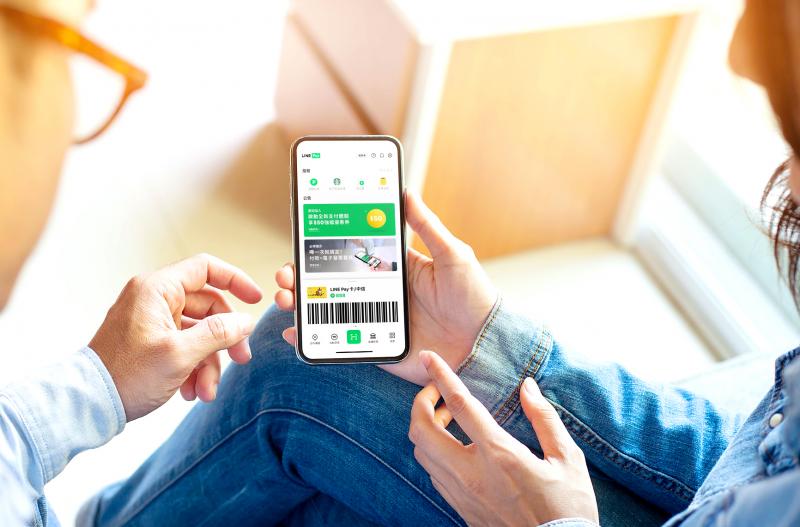The 4.55 million users of iPass Money — the nation’s second-largest electronic payment service, which was previously called Line Pay Money — found the service more inconvenient to use after iPass Corp (一卡通票證) and Line Pay Taiwan (連加網路商業) separated.
The service was initially a collaboration of the two companies, but it has been solely operated by iPass since Line Pay sold its stake in the service and walked out of the iPass boardroom in November last year, data from the companies showed.
However, iPass, a Kaohsiung-based stored-value card company, does not have an independent payment app for users, so the users still have to use the apps managed by Line Pay and its affiliate, Line Taiwan Ltd (台灣連線), to access iPass Money services.

Photo courtesy of Line Pay Taiwan Ltd
Line Pay on Tuesday renewed its Line Pay payment app, which no longer offers access to iPass Money, and the company said in a statement that the older version of the app would cease to work from May 1.
After that deadline, the 4.55 million users of iPass Money must log into Line Taiwan’s Line messaging app, select the “Wallet” function, click “Line Pay,” and then click “iPass Money” to pay or transfer funds, a process that users said is more inconvenient than when they could gain access through a couple of apps.
Moreover, this sole means of access might disappear next year, as the Financial Supervisory Commission (FSC) told a videoconference on Tuesday that iPass’ contract with Line Pay is to expire in February next year.
At that point, users of iPass Money would no longer be able to use the Line app to pay or transfer funds, Banking Bureau Chief Secretary Phil Tong (童政彰) said.
However, iPass has told the commission that it would establish its own app, which it plans to launch by the end of this year, Tong said.
Line Pay would manage its own payment service, which is a third-party payment service, Tong added.
A third-party payment service is different from an electronic payment service in that users cannot transfer money to each other or link to users’ bank accounts, the FSC said.
One female user told the Taipei Times that friends had transferred thousands of New Taiwan dollars into her iPass Money account, and she does not know whether she should rush to spend the funds before next year.
Line Pay said that the decision to remove access to iPass Money from its new app was based on considerations of time and resources.
If it had integrated the service into its app, it would have needed to spend more time developing the new app, it said.
Line Pay said that it planned to ask iPass whether it wanted to extend its contract next year, but that discussions had not begun.
The rights of its users would not be affected, iPass said in a statement.

WEAKER ACTIVITY: The sharpest deterioration was seen in the electronics and optical components sector, with the production index falling 13.2 points to 44.5 Taiwan’s manufacturing sector last month contracted for a second consecutive month, with the purchasing managers’ index (PMI) slipping to 48, reflecting ongoing caution over trade uncertainties, the Chung-Hua Institution for Economic Research (CIER, 中華經濟研究院) said yesterday. The decline reflects growing caution among companies amid uncertainty surrounding US tariffs, semiconductor duties and automotive import levies, and it is also likely linked to fading front-loading activity, CIER president Lien Hsien-ming (連賢明) said. “Some clients have started shifting orders to Southeast Asian countries where tariff regimes are already clear,” Lien told a news conference. Firms across the supply chain are also lowering stock levels to mitigate

IN THE AIR: While most companies said they were committed to North American operations, some added that production and costs would depend on the outcome of a US trade probe Leading local contract electronics makers Wistron Corp (緯創), Quanta Computer Inc (廣達), Inventec Corp (英業達) and Compal Electronics Inc (仁寶) are to maintain their North American expansion plans, despite Washington’s 20 percent tariff on Taiwanese goods. Wistron said it has long maintained a presence in the US, while distributing production across Taiwan, North America, Southeast Asia and Europe. The company is in talks with customers to align capacity with their site preferences, a company official told the Taipei Times by telephone on Friday. The company is still in talks with clients over who would bear the tariff costs, with the outcome pending further

Six Taiwanese companies, including contract chipmaker Taiwan Semiconductor Manufacturing Co (TSMC, 台積電), made the 2025 Fortune Global 500 list of the world’s largest firms by revenue. In a report published by New York-based Fortune magazine on Tuesday, Hon Hai Precision Industry Co (鴻海精密), also known as Foxconn Technology Group (富士康科技集團), ranked highest among Taiwanese firms, placing 28th with revenue of US$213.69 billion. Up 60 spots from last year, TSMC rose to No. 126 with US$90.16 billion in revenue, followed by Quanta Computer Inc (廣達) at 348th, Pegatron Corp (和碩) at 461st, CPC Corp, Taiwan (台灣中油) at 494th and Wistron Corp (緯創) at

NEGOTIATIONS: Semiconductors play an outsized role in Taiwan’s industrial and economic development and are a major driver of the Taiwan-US trade imbalance With US President Donald Trump threatening to impose tariffs on semiconductors, Taiwan is expected to face a significant challenge, as information and communications technology (ICT) products account for more than 70 percent of its exports to the US, Chung-Hua Institution for Economic Research (CIER, 中華經濟研究院) president Lien Hsien-ming (連賢明) said on Friday. Compared with other countries, semiconductors play a disproportionately large role in Taiwan’s industrial and economic development, Lien said. As the sixth-largest contributor to the US trade deficit, Taiwan recorded a US$73.9 billion trade surplus with the US last year — up from US$47.8 billion in 2023 — driven by strong